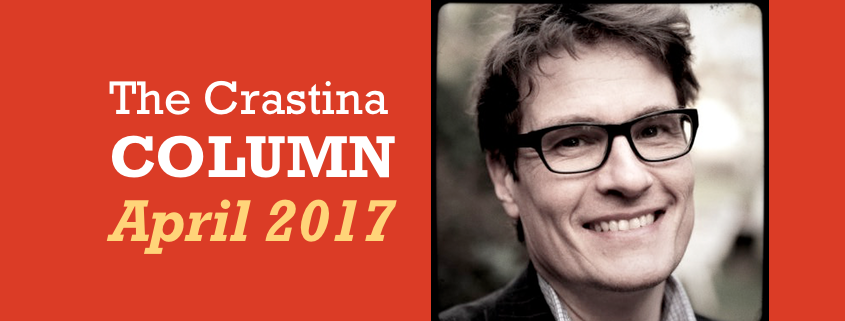Crastina Column, April 2017: “Lamenting the wordiness of learned people” by Olle Bergman
“Text, text, everywhere, Nor any message to get.” Paraphrasing Coleridge, we introduce this month’s theme: ”short & punchy”. Our column writer is Olle Bergman, Swedish freelance writer and project leader of Crastina.

Exhibit A: The Decalogue, or Ten Commandments, hugely impacted the world since the 7th century BC.
And yet it was printed (according to tradition) on just two stone slabs.
Exhibit B: The article Molecular Structure of Nucleic Acids: A Structure for Deoxyribose Nucleic Acid by Francis Crick and James D. Watson hugely impacted the world since 25 April 1953.
And yet it filled just one page of the scientific journal Nature.
Exhibit C: The online document The Manifesto for Agile Software Development hugely impacted the world since February 2001.
And yet, it has fewer words than the text that you are currently reading.
These three texts are the result of extended observation, analysis and thinking. But they all manage to convey ideas concisely. To make these ideas easy to grasp, the creators removed any material that could obscure the reader’s view.
We can learn three things from this:
- Time spent by the sender, is time saved by the receiver.
- Superfluous information hides core content.
- Concise writers have to be brave: to make a point is to take a stand!
Unfortunately, many professionals are moving in the opposite direction, helped by electronic writing tools. As the pace of modern life increases, so does wordiness. Brevity and clarity take time; lengthiness and murkiness is a sign of haste. Every ten minutes a writer saves, the reader loses.
Here are a few ways to avoid wordiness:
- Make sure you know your subject. If you don’t, read more.
- Before you start typing, define a first version of your main ideas. Maybe with a pencil and a notebook?
- There are always things you can remove from your text. Kill your darlings.
Shakespeare once wrote that “Brevity is the soul of wit”. I agree.
And I am done here – full stop.
- Claire Price of Crastina receives outreach award from Royal Society of Biology - October 25, 2020
- Agile Science student project at Brussels Engineering School ECAM: “We can’t wait to try it again!” - August 28, 2020
- Create an infographic in the Lifeology SciArt Infographic Challenge - June 16, 2020
- Adam Ruben – The scientist that teaches undergraduate students comedy - March 27, 2020
- Sam Gregson, Bad Boy of Science: “Comedy helps to bridge the gap” - March 10, 2020
- The Coolest Science Merchandise of 2019 - December 16, 2019
- Science Media Centre (UK) offers guide on dealing with online harassment in academia - November 26, 2019
- Agile project management taught to students and researchers at Karolinska Institutet - September 20, 2019
- Stefan Jansson: Improve your credibility! (Crastina Column, September 2019) - September 6, 2019
- The People’s Poet: Silke Kramprich, tech communicator - August 31, 2019





As true as ever! And probably more important than ever, considering the sheer amount of communication being produced and shared.
Arguably, Crick and Watson’s paper (besides taking results from Rosalyn Franklin) would be a challenge to get published these days. Very eloquent and concise, no doubt, but not much direct evidence for their claims inside, relying instead on the two papers that followed in the same issue.